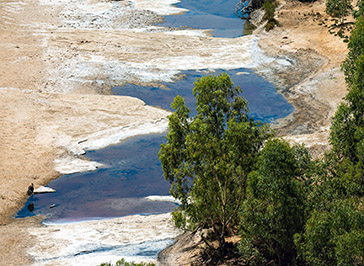Western Australian waterways are under threat of drying out, with ancient and endemic aquatic life disappearing forever in some areas, scientists warn.

Wetland Research and Management senior environmental consultant and aquatic ecology researcher Dr Nicole Carey says that waterways are drying out all across our Southwest region which is impacting a range of life, including dragonflies, caddisflies, mayflies and other aquatic invertebrates.
“Our rivers and streams which used to flow permanently are now dry for six months of the year which is a profound change for these systems,” Dr Carey said.
Since the 1970s, a gradual decline in rainfall and increased temperatures are causing WA waterways like the Wungong River to flow only seasonally rather than perennially.
According to the Water Corporation, by 2030 Perth’s winter rainfall will decline further up to 15%.
Dr Carey, who recently conducted research at Murdoch University’s Harry Butler Institute and published a report about drying waterways, explains that aquatic life which is restricted to permanently flowing systems cannot complete their life cycle when the streams dry up.
“They perform a lot of important roles in our environment. As they disappear from our rivers and streams they’re gone forever, which is a shame,” she commented.
Their populations are declining, some species like the dragonfly are extinct in localities they were previously common to, and their loss can alter our ecosystems.
These aquatic species are unique to WA and are responsible for maintaining healthy ecosystems as they cycle nutrients and support biodiversity.
Conservation Council of WA (CCWA) public relations manager Robert Davies says drying waterways are a serious issue for conservation and WA must act to stop these effects of climate change because it’s possible that by 2050 large swathes of our state will run out of fresh water.
The WA state government is investing in desalination plants but this is unlikely to be enough.
“As the only state where emissions have increased in real terms – and continue to increase – and where the state government takes an active role in enabling and encouraging the building of new and expanded fossil fuel projects, the pressure on habitats which rely on our waterways will only increase,” he said.
However, Dr Carey thinks we can still turn things around by looking after our local waterways and giving the aquatic life a chance to repopulate.
“Any sorts of refuges in the environment can be important. Restoring native vegetation around streams on your property or improving water quality can go a long way to protecting these organisms,” she said.
